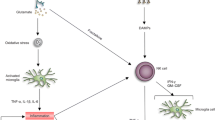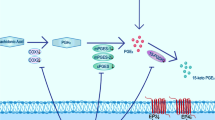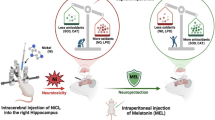Abstract
Intracerebral hemorrhage (ICH) initiates a neuroinflammatory cascade that contributes to substantial neuronal damage and neurological deterioration. Taurine, an abundant amino acid in the nervous system, is reported to reduce inflammatory injury in various central nervous system diseases, but its role and the possible underlying mechanisms in the pathology following ICH remains unclear. This study was designed to evaluate the effect of taurine supplementation on neurological deficits, acute inflammatory responses and white matter injury in a model of ICH in rats. Adult male Sprague–Dawley (SD) rats subjected to collagenase-induced ICH injury were injected intravenously with different concentrations of taurine or vehicle 10 min after ICH and subsequently daily for 3 days. Behavioral studies, brain water content, and assessments of hemorrhagic lesion volume were quantified at day 1 and day 3 post-ICH. Neuronal damage, peri-hematomal inflammatory responses, and white matter injury were determined at 24 h, meanwhile, the content of hydrogen sulfide (H2S) along with the expression of cystathionine-β-synthase (CBS) and P2X7 receptor (P2X7R) in peri-hematomal tissues was analyzed to investigate the possible anti-inflammatory mechanism of taurine. Treatment with a high dosage of taurine (50 mg/kg) significantly attenuated functional deficits and reduced brain edema and hemorrhagic lesion volume after ICH. Taurine administration also resulted in significant amelioration of neuronal damage and white matter injury. These changes were associated with marked reductions in neutrophil infiltration, glial activation, and expression levels of inflammatory mediators. Moreover, the anti-inflammatory effect of taurine was accompanied by increased H2S content, enhanced CBS expression, and less expression of P2X7R. Our study demonstrated that the high dosage of taurine supplementation effectively mitigated the severity of pathological inflammation and white matter injury after ICH, and the mechanism may be related to upregulation of H2S content and reduced P2X7R expression.






Similar content being viewed by others
References
Barges-Coll J, Perez-Neri I, Avendano J, Mendez-Rosito D, Gomez-Amador JL, Rios C (2013) Plasma taurine as a predictor of poor outcome in patients with mild neurological deficits after aneurysmal subarachnoid hemorrhage. J Neurosurg 119(4):1021–1027. https://doi.org/10.3171/2013.4.JNS121558
Chen S, Yang Q, Chen G, Zhang JH (2015) An update on inflammation in the acute phase of intracerebral hemorrhage. Transl Stroke Res 6(1):4–8. https://doi.org/10.1007/s12975-014-0384-4
Chouraki V, Preis SR, Yang Q, Beiser A, Li S, Larson MG, Weinstein G, Wang TJ, Gerszten RE, Vasan RS, Seshadri S (2017) Association of amine biomarkers with incident dementia and Alzheimer’s disease in the Framingham Study. Alzheimers Dement. https://doi.org/10.1016/j.jalz.2017.04.009
DiNicolantonio JJ, OK JH, McCarty MF (2017) Boosting endogenous production of vasoprotective hydrogen sulfide via supplementation with taurine and N-acetylcysteine: a novel way to promote cardiovascular health. Open Heart 4(1):e000600. https://doi.org/10.1136/openhrt-2017-000600
Egashira Y, Hua Y, Keep RF, Xi G (2014) Acute white matter injury after experimental subarachnoid hemorrhage: potential role of lipocalin 2. Stroke 45(7):2141–2143. https://doi.org/10.1161/STROKEAHA.114.005307
El Idrissi A (2008) Taurine increases mitochondrial buffering of calcium: role in neuroprotection. Amino Acids 34(2):321–328. https://doi.org/10.1007/s00726-006-0396-9
Foos TM, Wu JY (2002) The role of taurine in the central nervous system and the modulation of intracellular calcium homeostasis. Neurochem Res 27(1–2):21–26
Gordon S (2003) Alternative activation of macrophages. Nat Rev Immunol 3(1):23–35. https://doi.org/10.1038/nri978
Guler L, Tavlasoglu M, Yucel O, Guler A, Sahin MA, Kurkluoglu M, Sirin Y, Eken A, Gamsizkan M, Dakak M, Gurkok S, Genc O (2014) Taurine attenuates lung ischemia-reperfusion injury after lung transplantation in rats. J Anesth 28(3):347–353. https://doi.org/10.1007/s00540-013-1741-2
Hayes KC, Carey RE, Schmidt SY (1975) Retinal degeneration associated with taurine deficiency in the cat. Science 188(4191):949–951
Huxtable RJ (1992) Physiological actions of taurine. Physiol Rev 72(1):101–163
Hwang BY, Appelboom G, Ayer A, Kellner CP, Kotchetkov IS, Gigante PR, Haque R, Kellner M, Connolly ES (2011) Advances in neuroprotective strategies: potential therapies for intracerebral hemorrhage. Cerebrovasc Dis 31(3):211–222. https://doi.org/10.1159/000321870
Jacobsen JG, Smith LH (1968) Biochemistry and physiology of taurine and taurine derivatives. Physiol Rev 48(2):424–511
Jacobson I, Sandberg M, Hamberger A (1985) Mass transfer in brain dialysis devices—a new method for the estimation of extracellular amino acids concentration. J Neurosci Methods 15(3):263–268
Jong CJ, Azuma J, Schaffer S (2012) Mechanism underlying the antioxidant activity of taurine: prevention of mitochondrial oxidant production. Amino Acids 42(6):2223–2232. https://doi.org/10.1007/s00726-011-0962-7
Jong CJ, Ito T, Prentice H, Wu JY, Schaffer SW (2017) Role of mitochondria and endoplasmic reticulum in taurine-deficiency-mediated apoptosis. Nutrients. https://doi.org/10.3390/nu9080795
Kamoun P (2004) Endogenous production of hydrogen sulfide in mammals. Amino Acids 26(3):243–254. https://doi.org/10.1007/s00726-004-0072-x
Keep RF, Hua Y, Xi G (2012) Intracerebral haemorrhage: mechanisms of injury and therapeutic targets. Lancet Neurol 11(8):720–731. https://doi.org/10.1016/S1474-4422(12)70104-7
Kuriyama K (1980) Taurine as a neuromodulator. Fed Proc 39(9):2680–2684
Li R, Ma K, Zhao H, Feng Z, Yang Y, Ge H, Zhang X, Tang J, Yin Y, Liu X, Tan L, Feng H (2016) Cattle encephalon glycoside and ignotin reduced white matter injury and prevented post-hemorrhagic hydrocephalus in a rat model of intracerebral hemorrhage. Sci Rep 6:35923. https://doi.org/10.1038/srep35923
Menzie J, Prentice H, Wu JY (2013) Neuroprotective mechanisms of taurine against ischemic stroke. Brain Sci 3(2):877–907. https://doi.org/10.3390/brainsci3020877
Miao J, Zhang J, Zheng L, Yu X, Zhu W, Zou S (2012) Taurine attenuates Streptococcus uberis-induced mastitis in rats by increasing T regulatory cells. Amino Acids 42(6):2417–2428. https://doi.org/10.1007/s00726-011-1047-3
Nakajima Y, Osuka K, Seki Y, Gupta RC, Hara M, Takayasu M, Wakabayashi T (2010) Taurine reduces inflammatory responses after spinal cord injury. J Neurotrauma 27(2):403–410. https://doi.org/10.1089/neu.2009.1044
Nielsen HH, Ladeby R, Drojdahl N, Peterson AC, Finsen B (2006) Axonal degeneration stimulates the formation of NG2+ cells and oligodendrocytes in the mouse. Glia 54(2):105–115. https://doi.org/10.1002/glia.20357
Sangha N, Gonzales NR (2011) Treatment targets in intracerebral hemorrhage. Neurotherapeutics 8(3):374–387. https://doi.org/10.1007/s13311-011-0055-z
Saransaari P, Oja SS (2000) Taurine and neural cell damage. Amino Acids 19(3–4):509–526
Schaffer SW, Azuma J, Mozaffari M (2009) Role of antioxidant activity of taurine in diabetes. Can J Physiol Pharmacol 87(2):91–99. https://doi.org/10.1139/Y08-110
Seki Y, Kimura M, Mizutani N, Fujita M, Aimi Y, Suzuki Y (2005) Cerebrospinal fluid taurine after traumatic brain injury. Neurochem Res 30(1):123–128
Su Y, Fan W, Ma Z, Wen X, Wang W, Wu Q, Huang H (2014) Taurine improves functional and histological outcomes and reduces inflammation in traumatic brain injury. Neuroscience 266:56–65. https://doi.org/10.1016/j.neuroscience.2014.02.006
Sun M, Zhao Y, Gu Y, Xu C (2012) Anti-inflammatory mechanism of taurine against ischemic stroke is related to down-regulation of PARP and NF-kappaB. Amino Acids 42(5):1735–1747. https://doi.org/10.1007/s00726-011-0885-3
Sun Q, Wang B, Li Y, Sun F, Li P, Xia W, Zhou X, Li Q, Wang X, Chen J, Zeng X, Zhao Z, He H, Liu D, Zhu Z (2016) Taurine supplementation lowers blood pressure and improves vascular function in prehypertension: randomized, double-blind, placebo-controlled study. Hypertension 67(3):541–549. https://doi.org/10.1161/HYPERTENSIONAHA.115.06624
Wang J (2010) Preclinical and clinical research on inflammation after intracerebral hemorrhage. Prog Neurobiol 92(4):463–477. https://doi.org/10.1016/j.pneurobio.2010.08.001
Wang Q, Fan W, Cai Y, Wu Q, Mo L, Huang Z, Huang H (2016) Protective effects of taurine in traumatic brain injury via mitochondria and cerebral blood flow. Amino Acids 48(9):2169–2177. https://doi.org/10.1007/s00726-016-2244-x
Wang J, Wang G, Yi J, Xu Y, Duan S, Li T, Sun XG, Dong L (2017) The effect of monascin on hematoma clearance and edema after intracerebral hemorrhage in rats. Brain Res Bull 134:24–29. https://doi.org/10.1016/j.brainresbull.2017.06.018
Ward RJ, Lallemand F, de Witte P, Crichton RR, Piette J, Tipton K, Hemmings K, Pitard A, Page M, Della Corte L, Taylor D, Dexter D (2011) Anti-inflammatory actions of a taurine analogue, ethane beta-sultam, in phagocytic cells, in vivo and in vitro. Biochem Pharmacol 81(6):743–751. https://doi.org/10.1016/j.bcp.2010.12.030
Weissert R (2013) The immune pathogenesis of multiple sclerosis. J Neuroimmune Pharmacol 8(4):857–866. https://doi.org/10.1007/s11481-013-9467-3
Wu JY (1982) Purification and characterization of cysteic acid and cysteine sulfinic acid decarboxylase and l-glutamate decarboxylase from bovine brain. Proc Natl Acad Sci USA 79(14):4270–4274
Yamori Y, Taguchi T, Hamada A, Kunimasa K, Mori H, Mori M (2010) Taurine in health and diseases: consistent evidence from experimental and epidemiological studies. J Biomed Sci 17(Suppl 1):S6. https://doi.org/10.1186/1423-0127-17-S1-S6
Yang F, Wang Z, Zhang JH, Tang J, Liu X, Tan L, Huang QY, Feng H (2015) Receptor for advanced glycation end-product antagonist reduces blood-brain barrier damage after intracerebral hemorrhage. Stroke 46(5):1328–1336. https://doi.org/10.1161/STROKEAHA.114.008336
Zhang F, Mao Y, Qiao H, Jiang H, Zhao H, Chen X, Tong L, Sun X (2010) Protective effects of taurine against endotoxin-induced acute liver injury after hepatic ischemia reperfusion. Amino Acids 38(1):237–245. https://doi.org/10.1007/s00726-009-0233-z
Zhao H, Zhang X, Dai Z, Feng Y, Li Q, Zhang JH, Liu X, Chen Y, Feng H (2016) P2X7 receptor suppression preserves blood-brain barrier through inhibiting rhoa activation after experimental intracerebral hemorrhage in rats. Sci Rep 6:23286. https://doi.org/10.1038/srep23286
Zhao H, Pan P, Yang Y, Ge H, Chen W, Qu J, Shi J, Cui G, Liu X, Feng H, Chen Y (2017) Endogenous hydrogen sulphide attenuates NLRP3 inflammasome-mediated neuroinflammation by suppressing the P2X7 receptor after intracerebral haemorrhage in rats. J Neuroinflammation 14(1):163. https://doi.org/10.1186/s12974-017-0940-4
Zhuo F, Qiu G, Xu J, Yang M, Wang K, Liu H, Huang J, Lu W, Liu Q, Xu S, Huang S, Sun S (2016) Both endoplasmic reticulum and mitochondrial pathways are involved in oligodendrocyte apoptosis induced by capsular hemorrhage. Mol Cell Neurosci 72:64–71. https://doi.org/10.1016/j.mcn.2016.01.009
Ziai WC (2013) Hematology and inflammatory signaling of intracerebral hemorrhage. Stroke 44(6 Suppl 1):S74–S78. https://doi.org/10.1161/STROKEAHA.111.000662
Zou X, Wu Z, Zhu W, Chen L, Mao Y, Zhao F (2017) Effectiveness of minocycline in acute white matter injury after intracerebral hemorrhage. J Neurosurg 126(6):1855–1862. https://doi.org/10.3171/2016.5.JNS152670
Zulli A (2011) Taurine in cardiovascular disease. Curr Opin Clin Nutr Metab Care 14(1):57–60. https://doi.org/10.1097/MCO.0b013e328340d863
Zuo S, Pan P, Li Q, Chen Y, Feng H (2017) White matter injury and recovery after hypertensive intracerebral hemorrhage. Biomed Res Int 2017:6138424. https://doi.org/10.1155/2017/6138424
Funding
This work was supported by the National Basic Research Program of China (973 Program, Grant number 2014CB541600), the National Natural Science Foundation of China (Grant numbers 81501002), the Basic Science and Advanced Technology Research Project of Chongqing (Grant number cstc2016jcyjA0114), and the Major Innovation Project of Southwest Hospital (Grant number SWH2016ZDCX1011).
Author information
Authors and Affiliations
Corresponding authors
Ethics declarations
Conflict of interest
The authors declare that they have no conflict of interest.
Additional information
Handling Editor: S. W. Schaffer.
Rights and permissions
About this article
Cite this article
Zhao, H., Qu, J., Li, Q. et al. Taurine supplementation reduces neuroinflammation and protects against white matter injury after intracerebral hemorrhage in rats. Amino Acids 50, 439–451 (2018). https://doi.org/10.1007/s00726-017-2529-8
Received:
Accepted:
Published:
Issue Date:
DOI: https://doi.org/10.1007/s00726-017-2529-8




